How I Trained My Children to Be Leaders
By Jeannette Webb
Printed in Practical Homeschooling #79, 2007.
 Jeannette lets us in on some of the secrets that have led to her children's amazing success.
Jeannette lets us in on some of the secrets that have led to her children's amazing success.

|
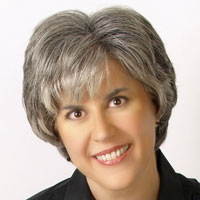 |
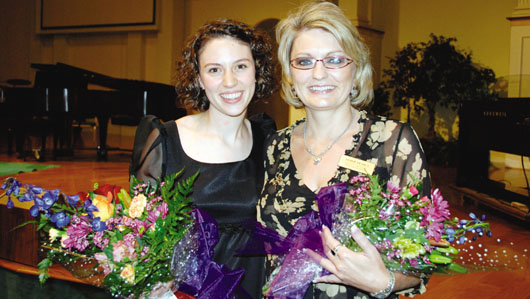
Natalie Webb and Debbie Pearey, Director of the Pregnancy Care Center of Western Oklahoma, after a successful Concert for Life.
Top colleges are looking for leaders who can take full advantage of the opportunities a good college will give them. Of course, they don't fill their whole class with leaders - they are also looking for humanitarians, go-getters, and entrepreneurs. But if you look carefully at the list of characteristics admissions officers prize, every one of them reflects leadership:
- Drive
- Desire to fix problems
- Motivation
- The ability to think "outside the box"
- The gift of understanding and managing people
Early Training
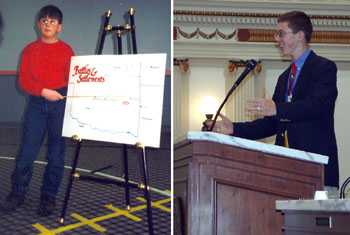
Before: A very reluctant Austin Webb, age 9, at Communication Club giving a speech only because his mother insisted.
After: Austin making a speech at the state capitol. |
One of my children was a born leader. My other child was a reluctant leader who had to be coached in baby steps for years.
We began by accepting leadership responsibilities as a family. Each child would have his or her own tiny roles.
We practiced a lot. For example, when an important phone conversation was coming up, we talked about it ahead of time and then analyzed the conversation afterward to see how it could have been more effective.
Volunteering
It is important to understand that volunteering is not leadership, but it does help children see what leadership entails so that it is a natural progression as they work their way up the ladder.
The children helped me organize homeschool support group meetings and shadowed us at community meetings or events. To teach them public speaking and presentation skills, I started a communications club for our homeschool group, then volunteered my son to teach small merit badge lessons at Boy Scout meetings.
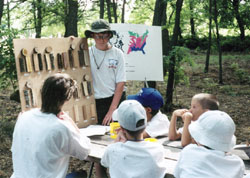
Austin Webb (age 14) teaching at cub scout day camp. |
As my homeschool students became more mature, I began to turn over increasing responsibility. When the kids hit a snag, I waited for them to figure out the problem first before I jumped in with solutions.
An unexpected bonus of their time spent helping to organize events is that they take into adulthood an appreciation for the work involved in any organization. They are grateful to others who expend time in their behalf.
Real Leadership with Real Results
In our homeschool, it was required that each student tackle a huge leadership project before graduation. Leadership training was just as important (but not more important) than calculus. I felt it was important, while my children were still at home, to "shake them up" and see what they were made of.
Through the years I have learned that when kids have real responsibilities, when someone is depending on them, when someone might suffer if they don't do their job, the experience fundamentally changes them. I never set my children up to fail, but I made the bar high enough that failure was a possibility. It is risky, but I wanted to be there to catch them if they botched an activity. It would be far more devastating for that to occur in college or in later life, when they are far from home.
Watching my children perform in leadership roles also gives me a chance to see if they maintain grace under pressure and if they remain loving if others are not loving to them. This is one of the few ways to really see if the years of character training actually worked. When they hit the wall, will they crumble and remain in a heap or will they get up and figure out how to work smarter next time? Did the experience damage their faith or strengthen it? These are important things to know before we send our kids into the cultural and spiritual war zone that is college.
From "I Hate to Phone" to Publicity Leader
As other writers are beginning to say, teens really can do much more than most adults expect. Here's an example from my family's experience with TeenPact, a group that teaches children and teens how to work through the political process.
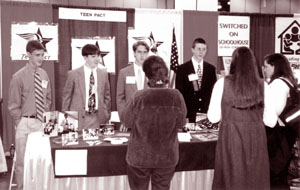
Austin Webb, far right, in 2003, manning a TeenPact promotional booth that he organized for the state homeschool convention. |
My son, Austin, attended his first TeenPact class at the age of 15. There were only four students that year and the national organization was looking for someone to coordinate the program in Oklahoma. I accepted the job and promptly turned the responsibilities over to Austin.
Initially it was a painful experience for my introverted son. He initially hated making phone calls, but after making so many of them in this job became comfortable with it. He was somewhat at ease speaking in public by this age, but over the next two years, as he promoted TeenPact across the state (speaking to homeschool support groups and helping me teach "How to Raise Politically Incorrect Kids" classes at state conventions), he grew into his role and actually became quite an accomplished and humorous orator. He also learned other publicity skills, such as writing and producing radio public service announcements, writing articles for homeschool publications, organizing booths for state conventions, and creating flyers to homeschool events.
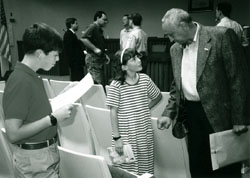
A young Austin and Natalie visiting with their city councilman to learn the dynamics of city government. |
Noting that other state groups in this fledgling organization were all "re-inventing the wheel," Austin created a State Coordinator Tool Kit for adults. It was implemented nationwide.
A final part of Austin's job for TeenPact was scheduling facilities and speakers. After doing this for two years in Oklahoma (during which time the class size increased seven-fold), he became the State Event Coordinator in Colorado during the year our family relocated there.
Early Political Experiences
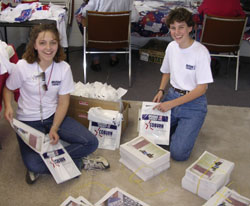
Petra Anderson, left (a homeschooler from CO) and Natalie Webb volunteering with Generation Joshua in the Coburn (Senate) / Bush campaign. |
Actually, our children's political leadership training started even earlier than this. Austin was in his first political campaign at the age of 5 months! His father ran for County Commissioner. He was only the second Republican to be elected in our county since statehood. For the next 10 years, the kids were shadows at precinct meetings and county conventions. They were an integral part of our campaigning efforts: knocking on doors, stuffing envelopes, etc. After their father lost his bid for the state legislature, they volunteered their time in other key races, both in Oklahoma and out of state. They worked with such groups as Madison Project and Generation Joshua, as well as helping in local races.
A Community Project
Our home state, Oklahoma, is in the middle of Tornado Alley. Several years earlier, a part of our largest city was totally destroyed and rescue workers did not know where to start digging for survivors. One fire chief said it looked like a war zone.
That horrible experience gave Austin the idea of implementing a Storm Shelter Registry program for the largest town in our county for his Eagle Scout project. The idea itself was simple: everyone would fill out a form with their address and a sketch of their home and the location of their storm shelter. The Boy Scouts would distribute these door-to-door one Saturday. People would then mail them to the fire department where they would be catalogued.
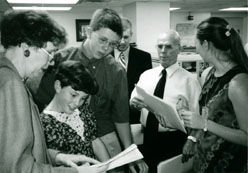
Austin and Natalie Webb at the state capitol looking at campaign finance disclosures, 2001 |
The hard part was the publicity campaign to help folks understand that this was not an invasion of their privacy but an attempt to protect them. After meeting with city officials and rescue workers, Austin began his information campaign. He spoke at civic groups, appeared on live radio shows and talked to reporters. The project was overwhelmingly successful and the mayor (a realtor) felt that they had 100 percent participation by those with shelters.
Scouting also provided Austin an opportunity to lead workshops at Boy Scout meetings and cub day camps on topics such as forestry, orienteering, safety, and first aid. But his Eagle project, which departed from the format of simply leading meetings that other people had planned, gave Austin a real chance to demonstrate true leadership.
Starting Their Own Group
One great leadership activity is for your children to start their own group, based on their own interests.
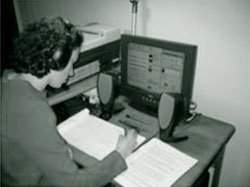
Natalie Webb during a debate meeting of the International Debate Society. |
Since we live in a very rural area, my kids didn't have access to a lot of traditional high school activities. We lived for one year in a state with a vibrant speech and debate community, during which time both of my kids fell in love with forensics (the science of debate).
When we moved back to the farm, Natalie was devastated to lose this newfound group of friends and an activity that she so enjoyed.
However, she and her best friend, Petra Anderson of Denver, put their heads together and decided to create The International Debate Society. This online debate club serves homeschool students across the nation, teaching Lincoln-Douglas Debate to beginning and advanced students alike.
Natalie and Petra spent hours planning logistics and writing applications, mission statements, rules, and lesson plans. They researched and found a telephony program for the club to use and wrote and rewrote lesson plans. Natalie put together a website and they designed flyers to promote the program. Each of them took a handful of flyers and spoke about IDS at debate workshops, homeschool group meetings, and state conventions.
Over the past three years, IDS has served 30 students from eight states. Many of these students live, like us, in rural areas and do not have access to a debate club other than IDS.
Organizing an Event
Here's another example of a leadership project that stretched my youngest student.
| Some Communications Ideas
Communication is an essential part of leadership training. For us, this included learning how to write for the media: newspaper items, magazine articles, and radio spots. These started out as practice, but soon my students were able to use these skills in the real world. A press release for a Boy Scout project, a magazine article about TeenPact, and radio spots promoting the Concert for Life were just a few of the ways that my students harnessed the media to publicize their projects.

Austin webb interviewing with Kevin Swanson (CHEC of Colorado) about TeenPact, Colorado branch that Austin was organizing
Press releases for newspapers: Always include your contact info so they can call you if they have any questions.
Radio Spots: Public Service Announcements are usually 30 seconds, but other common times are 1 minute, 2 minute, and 5 minute spots. Read your script out loud and time it with a stopwatch. Practice so you can pronounce everything clearly. If you trip up saying a word, change it! When writing your script, have something catchy at the beginning to get people listening. Be sure to include essential information (name of the event, time, date, location, etc.) at least twice.
|
When Natalie heard that our local Pregnancy Care Center ministry needed funds for an ultrasound machine, she came up with a plan to organize a benefit concert. She'd never seen it done before, but she was convinced that she could pull it off even though she was only 16. She requested a slot on the board meeting agenda and proceeded to stun board members with her unusual plan. She secured the largest church in town as the venue and contacted the music ministers of all area churches for performers from their congregations. She invited Christian music professors at the local college to participate as well. She asked each performer to be responsible for getting their church family to come. The final product was a wild mix of classical, instrumental, a capella, Christian contemporary, and praise music.
She convinced the local radio tycoon to give her free air time to run commercials that she wrote and produced, persuaded all the local printing companies to donate materials for the ad campaign she designed, and promoted the concert to local media (appearing live on radio programs and interviewing with newspaper reporters). She designed the short program that played before the concert, telling about the Center's work and sharing facts about the baby growing in the womb. She organized and performed in a piano trio with two university professors, worked with the sound technician and set-up crew, and emceed the concert.
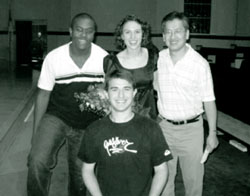
Natalie Webb and members of her violin studio who came to hear her perform at the Concert for Life. |
Natalie galvanized the community and the night of the concert there was a great turnout. The funds helped finance new equipment for the center, provided training for staff and board members, and helped stabilize the budget.

Natalie Webb (2007) in advertising blitz: putting posters up all over in Weatherford advertising Concert for Life. |
By tackling this huge project, this young girl received great training in advertising, sales, and management. She learned important lessons about herself and her ability to deal with the organizational issues that such a huge project presented. Most adults would never attempt a leadership feat like this one; however, my 16-year-old daughter, was ready for the challenge because I started giving her important work to do as a toddler. Therefore, she came to the job with 14 years of experience under her belt.
Public Speaking Is Essential
Sometimes you have to create the leadership training yourself. In my case, I see public speaking as a vital skill to teach any child, no matter how much they protest, since it is almost impossible to be a leader without it.
I work so hard helping kids because I am an extreme introvert myself. At my first 4-H speech contest at the age of 10, I literally locked myself in the women's restroom to avoid giving my speech! Because of this I have a heart for those who are terrified. So I started teaching a public speaking class for our entire homeschool group, called "Communication Club." Each month I asked for a different kind of speech: demonstration, illustrated talk, a speech with no props, an interactive display (much like a science fair), etc.
While Natalie was born for the stage, giving her first recitation before 200 people at the age of 5, it took Austin two solid years before he could relax and look at the audience while he spoke. The day finally came when he messed up and was able to make a joke about it and move on. We had turned a corner! By high school he had become a good public speaker and articulate debater. Communication Club did not hurt Natalie, either. The one year we lived in Colorado and that she was able to participate in NCFCA, she placed eighth in the nation with her original expository speech.
Avoid the Resume Trap and Activity Rut
Many students operate at opposite ends of the continuum regarding leadership. Either they over-compensate with leadership/extracurricular activities, or they forget the leadership component altogether and function only in the academic realm, hoping admission officers will overlook the fact that their lives are one-dimensional. Either choice is a dangerous one, not only for college admissions, but for life development.
I need to be upfront here and share with you that we NEVER EVER did any co-curricular, extracurricular, or leadership project so it would look good on a resume or college application. This kind of foolishness teaches our students the wrong priorities and will eventually erode family cohesiveness. When all the individuals in a family are each chasing after multitudes of impressive activities, we are no longer operating as a family unit moving toward our particular goals. We lose touch with each other in the chaos of every day.
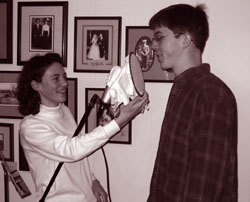
Natalie and Austin Webb at home recording a homeschool promotional voice-over for their state homeschool convention. |
To avoid this, the activities and leadership ventures of our family were chosen to broaden existing gifts or to strengthen a weakness that would hamper our children in the pursuit of their dreams. It was also important that our choices benefited the community in a real way.
We rarely did more than two or three things in a given year, often doing most of the work for a leadership project in the summer. The few activities we choose were pursued at a high level. After each goal was achieved, we usually moved on to another challenge.
It is important that we not allow our students to get stuck in an activity rut. Once a student has mastered something and made a contribution, there is no reason to continue repeating the same lessons year after year.
Nothing but the Best
As parents, we need to look past all the good activities and select only the fraction that are truly excellent: those that will stretch our children and make a difference in our world. We only have a few years to guide this young life that has been entrusted to us. While it takes foresight and much effort on the parent's part, raising leaders who will serve God and others is worth our sacrifice.
| Where Are They Now?
Austin Webb was accepted at Caltech, Harvard, MIT, Rice, University of Chicago, and Duke and offered a total of $859,500 in grants and scholarships. He became a Presidential Scholar, the top all-around National Merit Scholar, and a semifinalist in both the Intel Science Talent Search and Siemens Westinghouse Competition. Now in his junior year at the California Institute of Technology, Austin stays busy with class work and research in quantum computing.
Natalie is in her senior year of high school at home. She juggles a demanding college-prep school schedule, work on the family farm, administrative details for the International Debate Society, and college applications. She is also the administrator and a coach for the International Debate Society, the Associate Concertmaster of Oklahoma's premiere honors youth orchestra, principal violinist in a quartet, and teaches violin lessons. |